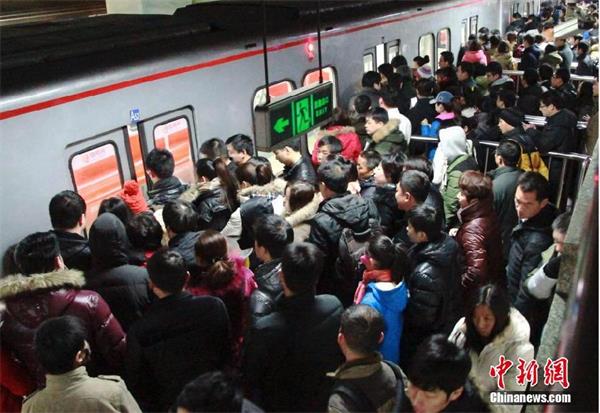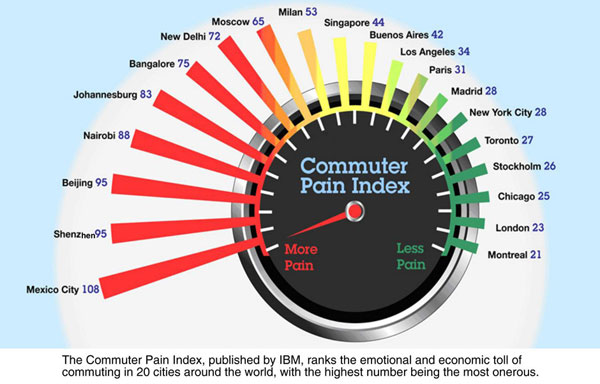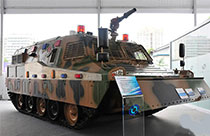


Commuters rush to get on the train in Beijing. [Photo/Chinanews.com]
Beijing will reduce its average commute by public transportation within the Fifth Ring Road from 97 minutes in 2014 (the nation's longest that year) to 60 minutes in 2020 by building a modernized comprehensive transportation system, Beijing Times reported, quoting a senior official on Tuesday.
This means Beijing commuters will spend one hour traveling within the Fifth Ring Road during daily peak hours, thanks to the multi-layer and diversified public transportation system expected in Beijing as of 2020, said Zhou Zhengyu, head of the Beijing Committee of Transportation.
Zhou said the traffic performance index will be kept within six, which indicates mild traffic congestion.
The traffic performance index, initiated in Beijing, rates traffic conditions on a scale of zero to ten, where zero to two indicates smooth traffic; two to four, basically smooth traffic; four to six, mild traffic congestion; six to eight, moderate congestion and eight to 10, heavy congestion.
Downtown Beijing's traffic congestion index had an average of 5.5 on a daily basis in 2014, while the index at times temporarily reached as high as eight during rushing hours, which totaled four hours.
Beijing will continue to control the number of private cars and take measures to increase the proportion of green travel including public transport, bicycles and walking, to 75 percent of all travel and reduce that of car travel, which includes private cars and taxis, to 25 percent downtown.
At present, the portion of private car travel among all travel means in the downtown area is 30 percent and that of taxis is 7 percent.

Beijing had 3.3 million new cars in 2014 and the city's car ownership increased by almost 160 percent in the 10 years between 2004 and 2014. In the meantime, the portion of public transport among all travel means increased from 29.4 percent to 48 percent.
Traffic congestion, a well-known urban woe accompanying urbanization, is obviously not unique in Beijing.
Guangzhou, Shanghai and Shenzhen had average commutes of almost 90 minutes in 2014, with residents of Tianjin, Nanjing, Shenyang and Chongqing spending more than 65 minutes traveling from home to work in the same year.
In IBM's 2011 Global Commuter Pain Survey, Beijing was named the city with the worst commuting conditions in the world, according to online magazine Smartplanet. Metropolises such as New York, Paris or Los Angeles, didn't even make the top 10.
 Student proposes during graduation ceremony
Student proposes during graduation ceremony China-made special vehicles in exhibition
China-made special vehicles in exhibition Soldiers serving at Liaoning aircraft carrier
Soldiers serving at Liaoning aircraft carrier Bikini beauties lifeguards in river rafting place
Bikini beauties lifeguards in river rafting place PLA soldiers eat raw snake meat in harsh training
PLA soldiers eat raw snake meat in harsh training Kiss contest held in Nanning, SW China
Kiss contest held in Nanning, SW China Yunnan-Myanmar Road: The past and present
Yunnan-Myanmar Road: The past and present Photos of beautiful policewoman become online hit
Photos of beautiful policewoman become online hit Campus belle of Xiamen University gets popular online
Campus belle of Xiamen University gets popular online Gettin’ Bei-jiggy
Gettin’ Bei-jiggy Diplomats risk own lives for China’s future
Diplomats risk own lives for China’s future Infrastructure projects needed for stability: experts
Infrastructure projects needed for stability: experts Chinese student detained in Iraq freed, to return home soon
Chinese student detained in Iraq freed, to return home soonDay|Week